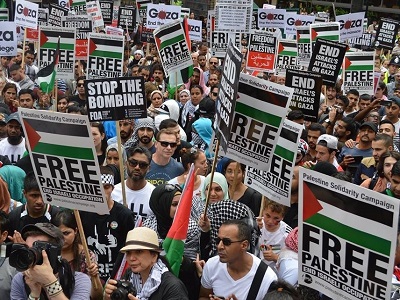
By Palestine Briefing
(Watch the House of Commons debate on Israeli settlements. Thursday February 9th 11.30 am – 2.30 pm. Foreign Office questions Tuesday February 21st 11.30 am)
Two days before Christmas the UK voted for UN resolution 2334 calling settlements a “flagrant violation of international law” and demanding an immediate freeze. Indeed the UK played a leading role in helping to improve the draft so that it would get through the Security Council.
Five days later, after US Secretary of State John Kerry had made his widely-acclaimed speech on Israel and Palestine, Theresa May put out a statement from Downing Street that struck an entirely different chord.
“We do not believe that the way to negotiate peace is by focusing on only one issue, in this case the construction of settlements, when clearly the conflict between the Israelis and Palestinians is so deeply complex. And we do not believe that it is appropriate to attack the composition of the democratically-elected government of an ally.”
The US State Department reacted with scarcely-concealed incredulity that the country that had for years been pressing them to take a more robust line on settlements had suddenly changed its tune: “We are surprised by the UK Prime Minister’s office statement given that Secretary Kerry’s remarks were in line with the UK’s own longstanding policy and its vote at the United Nations last week.”
Kerry’s speech had been welcomed with “strongly supportive statements”, they pointed out, “from across the world, including Germany, France, Canada, Jordan, Egypt, Turkey, Saudi Arabia, Qatar, the United Arab Emirates and others.”
On January 10 Boris Johnson told the Commons the UK would be represented at the Paris peace conference. He either misled the Commons or changed his mind because when the conference opened, five days later, neither Johnson, nor his junior minister, nor even the UK ambassador was there. Over 70 countries did attend to send a stern warning to Israel over the settlements but for the UK only an official was sent – and he was unable to sign the communique because he was only an observer.
On January 21 Trump took over. On January 25 Netanyahu approved 2,500 settler units with another 3,500 in the following days. The move was widely condemned.
Finally, six days later, on January 31, the White House issued a statement but it contradicted itself: “While we don’t believe the existence of settlements is an impediment to peace, the construction of new settlements or the expansion of existing settlements beyond their current borders may not be helpful in achieving that goal.”
Then, at the European Council in Malta, France, Sweden, Ireland, Austria, the Netherlands and Finland (but not the UK) were among the countries that forced a postponement of a summit between Israel and the European Union scheduled for February 28 because of Netanyahu’s announcement of new settlement building.
What’s going on? Are we seeing a historic shift in the position of the UK? Or is Theresa May just hoping she can persuade President Trump to soften his line? Or is she jettisoning any policy that might get in the way of a favorable trade agreement with the US?
MPs have a chance to find out on Thursday February 9th at the House of Commons Debate on Settlements or by tabling a question on Thursday February 9th for the next Foreign Office questions on Tuesday February 21st.
Whatever the final position of the Trump administration, this would seem to be the right moment for the UK to join with France and other European countries in sticking to its line on settlements and pointing out the realities to the new US administration before its position is fixed.
– For more information, click here.




